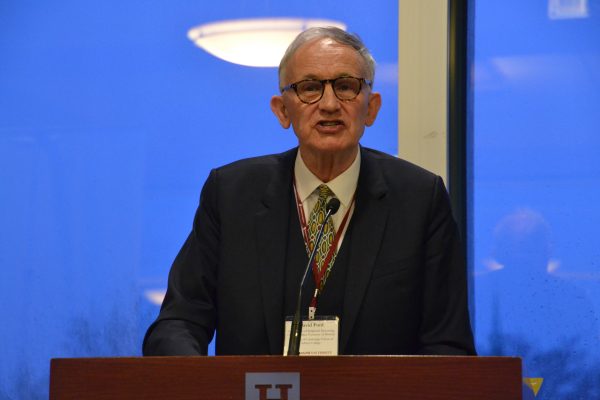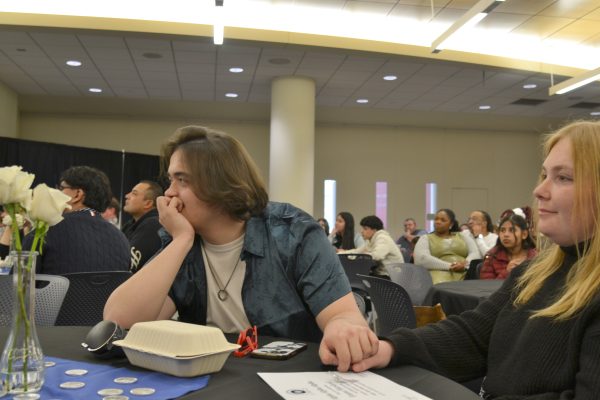Francophone Club launches with Creole Night
French language students form new club in response to phased out French program.
April 27, 2014
Last Thursday night, the usual hum of chatter in the Anderson center was punctuated by a few melodic French tones wafting from room 112. A group of around 20 students gathered to hear a lecture from Professor Kirk Martinson of the Modern Languages and Literature department and Ruben Joanem from the University of Minnesota. This marked Hamline’s Creole Night, sponsored by the Hamline Francophone Club.
Sophomores Ania McDonnell, Janney Drana and Sabrina Kennelly started the club last fall out of a desire to connect with other French-speaking students and to hone their verbal skills.
“The reason we didn’t just do ‘French Club’ is because we thought we’d want to incorporate other French-speaking countries,” McDonnell said.
Hence the inspiration for Creole night. Creole refers to the language that arises from two languages mixing together. Haitian Kreyòl, for example, began as a mixture of French and various African languages. Today, it is a complete language of its own, and is frequently spoken in Haiti.
Martinson opened the night with a brief lecture on how creoles form, and the general history of Haitian Kreyòl. He began by dispelling some of the myths about creole languages and asserting their legitimacy as a means of communication. Because Creole is a combination of two languages, there has historically been a tendency not to view them as fully-fledged languages of their own.
“People think that they are ‘less than’, when that is simply not the case,” Martinson said.
Creoles arise as two cultures interact. Martinson cited trading as one initial source for creoles—trade requires an understanding between both parties, and a need to communicate that understanding. In the case of Haitian Kreyòl, it arose because of the slave trade at the time.
Ruben Joanem from the University of Minnesota and a Haitian himself, followed Martinson’s lecture with a history of Kreyòl and a quick language lesson. He emphasized the language’s origins in slavery.
“Kreyòl is a language born out of a need to survive.” Joanem said. “It is almost an escape—it allows an oppressed people to survive.”
He furthered the discussion by describing the differences between Kreyòl and French. Kreyòl often combines French sentences into one word, simplifies sounds, and does away with the homophones found in French.
“The French really make it too complicated,” Joanem said with a laugh.
While the Francophone club sponsors events like the Creole night, most of their meetings are discussion-based. A discussion prompt will be posted on the group’s Facebook page, giving members a chance to mull over the prompt before the meeting that night.
“We say it’s in Franglias,” Drana said of the discussions, “because we have so many different levels of fluency that we have to say, ‘if you need to speak in English, speak in English’ and those who want to speak in French can speak in French, but you can tell them to clarify things for you.”
Over the past few years, the French program at Hamline has slowly been phasing out. The Francophone Club hopes to stir up interest in French programs and prove that they are still desired.
“Part of the reason to start the club was to show Hamline that there are people who are interested in French,” McDonnel said. “I don’t see why French had to be phased out. It’s just really frustrating for people.”
Both Drana and Kennelly share this desire.
“Based on the numbers, you can tell that there’s still a want and a need for a French program,” Kennelly said.
Drana echoed the sentiments, emphasizing the staggering number of French-speaking countries worldwide.
“It’s such a useful language,” Drana said.
Moving forward, the group hopes to implement more features into their club structure. Chief among them is setting up an informal crash course/support group for students who wish to take French at Macalester, but who are unsure of how to proceed. Hamline currently offers beginning and intermediate French, but not any advanced courses.
“Figuring out the ACTC is really tricky because the schedules don’t match up,” Drana said.
McDonnell echoed that sentiment, adding that even after signing up, the process can be daunting.
“When we went to our first class, we were really intimidated by Macalester. We didn’t know what was expected of us. So I think it’d be helpful too if we as a group said, ‘You know, this is kind of how it is, oh let me refer you to this professor over at Macalester.’ Hopefully that could be helpful to people too,” McDonnell said.
Additionally, the group hopes to sponsor more events, provide members with information about study abroad opportunities to French-speaking countries, and provide a valuable service for French-speaking students (or students interested in learning French) here at Hamline.
“The hope is that this club eventually will also be a resource for people who are looking to find ways to continue studying French because if you’ve already taken it in high school, you can take intermediate French here your freshman year, and then there’s not much else for you to do,” Drana said.
The Francophone Club, meanwhile, will continue to move forward. And with the success of events like Creole Night, perhaps it can become a campus staple. For meeting dates and times, visit the group’s Facebook page by searching “Hamline Francophone Club” on Facebook.





